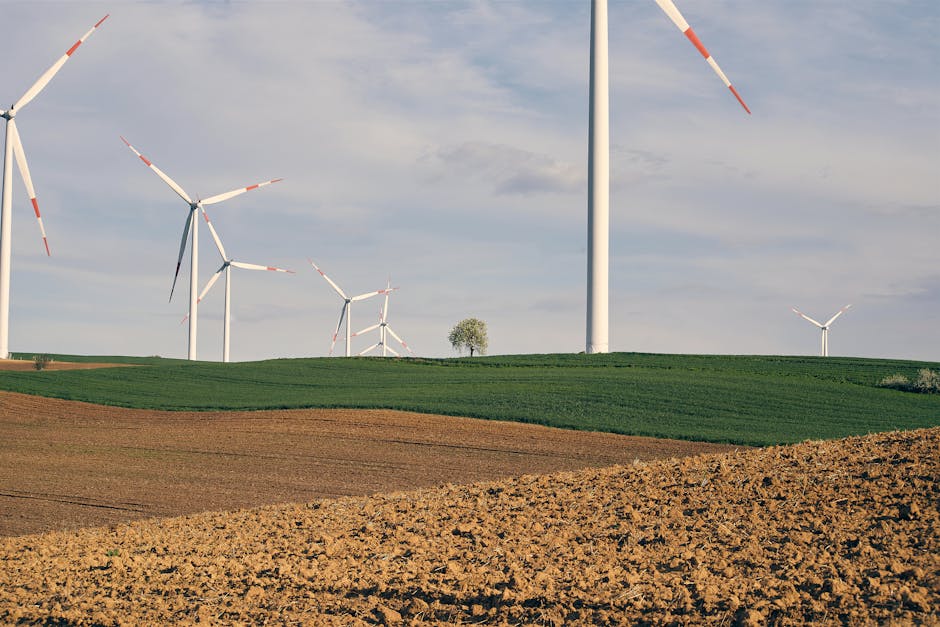The Rise of Eco-Friendly Technology: A Comprehensive Overview
In today’s fast-paced world, the concept of sustainability has become more than just a trend; it has evolved into a necessity. As we grapple with the consequences of climate change and environmental degradation, the importance of adopting eco-friendly technologies has never been more apparent. From renewable energy sources to energy-efficient appliances, eco-friendly technology is paving the way for a greener and more sustainable future. In this article, we will delve into the rise of eco-friendly technology, exploring its various facets, applications, and implications.
The Evolution of Eco-Friendly Technology

Advancements in eco-friendly technology have come a long way since the early days of environmental awareness. In the past, sustainability and technology were seen as opposing forces, with industrialization often leading to environmental harm. However, as we have become more aware of the impact of human activities on the planet, the need for eco-friendly solutions has grown exponentially. Today, eco-friendly technology encompasses a wide range of innovations aimed at reducing our carbon footprint, conserving resources, and protecting the environment.
One of the key drivers of the rise of eco-friendly technology is the increasing demand for sustainable solutions from both consumers and businesses. As more people become aware of the environmental consequences of their actions, there is a growing market for products and services that prioritize sustainability. This shift in consumer behavior has spurred companies to invest in eco-friendly technologies, driving innovation and pushing the boundaries of what is possible.
The Role of Renewable Energy

Renewable energy sources are at the forefront of the eco-friendly technology revolution. From solar and wind power to geothermal and hydroelectric energy, renewable sources offer a cleaner and more sustainable alternative to traditional fossil fuels. Solar panels, in particular, have seen a surge in popularity in recent years, with more homeowners and businesses opting to harness the power of the sun to generate electricity.
Wind turbines are another key player in the renewable energy sector, with wind farms popping up across the globe to take advantage of the power of the wind. These technologies not only reduce our reliance on fossil fuels but also help to combat climate change by reducing greenhouse gas emissions. As the technology continues to improve and become more affordable, renewable energy is poised to play a significant role in the transition to a more sustainable future.
The Impact of Energy-Efficient Appliances

Another important aspect of eco-friendly technology is the development of energy-efficient appliances. From refrigerators and washing machines to light bulbs and air conditioning units, energy-efficient appliances are designed to consume less energy while still providing the same level of performance. This not only helps to reduce electricity bills for consumers but also lowers overall energy consumption and greenhouse gas emissions.
Energy Star ratings have become a common feature on many appliances, indicating that they meet strict energy efficiency guidelines set by the Environmental Protection Agency. By choosing Energy Star certified products, consumers can make a significant impact on their carbon footprint without sacrificing quality or performance. As more manufacturers prioritize energy efficiency in their products, the market for eco-friendly appliances continues to grow.
The Rise of Electric Vehicles

One of the most exciting developments in eco-friendly technology is the rise of electric vehicles (EVs). With advancements in battery technology and infrastructure, EVs have become a viable alternative to traditional gasoline-powered cars. Not only do electric vehicles produce zero tailpipe emissions, but they also offer a smoother and quieter driving experience.
As concerns about air pollution and climate change continue to grow, many countries are incentivizing the adoption of electric vehicles through tax credits, rebates, and infrastructure investments. Companies like Tesla, Nissan, and Chevrolet have all entered the electric vehicle market, offering a range of models to suit different needs and budgets. As the technology improves and becomes more affordable, electric vehicles are poised to revolutionize the automotive industry and reduce our dependence on fossil fuels.
Smart Home Technology and Energy Management
Smart home technology is another area where eco-friendly innovations are making a big impact. From smart thermostats and lighting systems to energy monitoring devices and home automation, these technologies help homeowners reduce their energy consumption and carbon footprint. By allowing users to control their home’s energy use remotely and optimize their energy usage, smart home technology not only saves money but also helps to conserve resources.
For example, smart thermostats can learn a household’s schedule and adjust the temperature accordingly, reducing energy waste when no one is home. Similarly, smart lighting systems can be programmed to turn off when not in use, saving electricity and reducing energy costs. As more people embrace the convenience and efficiency of smart home technology, the market for eco-friendly home solutions is expected to grow.
The Future of Eco-Friendly Technology
Looking ahead, the future of eco-friendly technology is bright. As advancements continue to be made in renewable energy, energy efficiency, electric vehicles, and smart home technology, we can expect to see even more innovative solutions emerge. From grid-scale battery storage to sustainable materials and circular economies, the possibilities for eco-friendly technology are virtually endless.
However, challenges remain, such as the need for infrastructure upgrades, policy changes, and consumer education. In order to fully realize the potential of eco-friendly technology, we must work together to address these challenges and create a more sustainable future for generations to come. By investing in eco-friendly technologies and solutions today, we can help preserve the planet for tomorrow.
Common Misconceptions about Eco-Friendly Technology
Despite the many benefits of eco-friendly technology, there are still some misconceptions and myths surrounding this topic. One common misconception is that eco-friendly products are more expensive than their traditional counterparts. While it is true that some eco-friendly products may have a higher upfront cost, many of them can actually save consumers money in the long run through energy savings and reduced maintenance.
Another misconception is that eco-friendly technology is not as effective or reliable as traditional technology. In reality, many eco-friendly solutions are just as effective, if not more so, than their traditional counterparts. For example, energy-efficient appliances often perform better and last longer than conventional models, making them a smart investment for consumers.
Conclusion
To wrap things up, the rise of eco-friendly technology represents a crucial step towards a more sustainable future. From renewable energy sources to energy-efficient appliances, electric vehicles, and smart home technology, eco-friendly innovations are transforming the way we live and interact with the environment. By embracing these technologies and making conscious choices in our everyday lives, we can all contribute to a greener and healthier planet for future generations.
As we continue to explore the possibilities of eco-friendly technology and push the boundaries of innovation, it is clear that the future is bright. By working together to address the challenges and opportunities that lie ahead, we can create a world where sustainability is not just a goal but a reality. The time to act is now, and by harnessing the power of eco-friendly technology, we can pave the way for a better tomorrow.
Long story short, the rise of eco-friendly technology is not just a trend but a necessity. By investing in sustainable solutions and embracing eco-friendly innovations, we can all play a part in creating a more sustainable future for ourselves and the planet. Together, we can make a difference and pave the way for a greener, cleaner, and healthier world.




